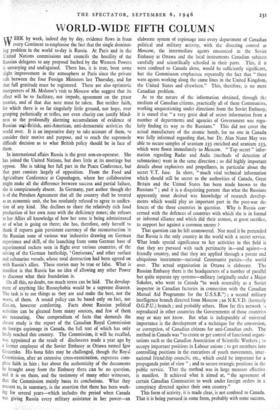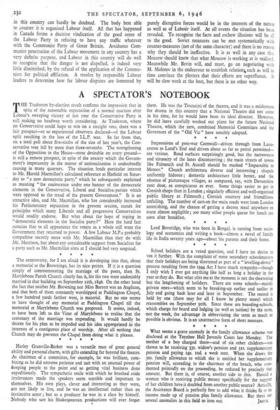WORLD-WIDE FIFTH COLUMN
EEK by week, indeed day by day,- evidence flows in from V V every Continent to emphasise the fact that the single dominat- ing problem in the world to-day is Russia. At Paris and in the United Nations commissions and councils the hostility of the Russian delegates to any proposal backed by the Western Powers is unvarying and undisguised. There has, it is true, been some slight improvement in the atmosphere at Paris since the private talk between the four Foreign Ministers last Thursday, and for that full gratitude must be registered. There are also optimistic interpreters of M. Molotov's visit to Moscow who suggest that its effect will be to facilitate, not impede, agreement on the peace treaties, and of that due note must be taken. But neither faith, for which there is so far singularly little ground, nor hope, ever grasping pathetically at trifles, nor even charity can justify blind- ness to the profoundly alarming accumulation of evidence of Russian an,ti-British, anti-American, anti-democratic activit:es the world over. It is an imperative duty to take account of them, to consider their motive and purpose, and to reach the supremely difficult decision as to what British policy Should be in face of them.
In international affairs Russia is the great non-co-operator. She has joined the United Nations, but does little at its meetings but oppose. She is taking her full part in the Peace Conference, but that part consists largely of opposition. From the Food and Agriculture Conference at Copenhagen, where her collaboration might make all the difference between success and partial failure, she is conspicuously absent. In Germany, part author though she is of the Potsdam Agreement that all the country shall be treated as an economic unit, she has resolutely refused to agree to unifica- tion of any kind. She declines to share the relatively rich food production of her own zone with the deficiency zones; she refuses to her Allies all knowledge of how her zone is being administered or of what is going on there; she has, therefore, only herself to thank if reports gain persistent currency of the reconstruction in the Russian zone of various war industries drawing on German experience and skill, of the launching from some German base of experimental rockets seen in flight over various countries, of the salving of the German battleship, Gneisenau,' and other surface and submarine vessels, whose total destruction had been agreed on with Russia's allies. These stories may be true or false. What is manifest is that Russia has no idea of allowing any other Power to discover what their foundation is.
On all this, no doubt, too much stress can be laid. The develop- ment of anything like Russophobia would be a supreme disaster. The task is to see things as they are and make the best, not the worst, of them. A sound policy can be based only on fact, not illus'on, however comforting. Facts about Russian political activities can be gleaned from many sources, and few of them are reassuring. One compendium of facts that demands the closest study is the report of the Canadian Royal Commission on foreign espionage in Canada, the full text of which has only lately reached this country. The Commission, it will be recalled, was appointed as the result of disclosures made a year ago by a former employee of the Soviet Embassy at Ottawa named Igor Gouzenko. His bona fides may be challenged, though the Royal Commission, after an extensive cross-examination, expresses com- plete faith in him ; but about the authenticity of the documents he brought away from the Embassy there can be no question, and it is on them, and the testimony of many other witnesses, that the Commission mainly bases its conclusions. What they amount to, in summary, is the assertion that there has been work- ing for several years—which includes the period when Canada Was giving Russia every military assistance in her power—an elaborate system of espionage into every department of Canadian political and military activity, with the directing control at Moscow, the intermediate agents ensconced in - the Soviet Embassy at Ottawa and the local instruments Canadian subjects carefully and scientifically schooled in their parts. This, if it were confined to Canada alone, would be sufficiently significant, but the Commission emphasises repeatedly the fact that "there were agents working along the same lines in the United Kingdom, the United States and elsewhere." This, therefore, is no mere Canadian problem.
As to the nature of the information obtained, through th medium of Canadian citizens, practically all of them Communists, working unquestioning under directions from the Soviet Embassy, it is stated that "a very great deal of secret information from a number of departments and agencies of Government was regu- larly finding its way to the Russians." This did not cover the actual manufacture of the atomic bomb, for no one in Canada was fully informed regarding that, but Dr. Alan Nunn May was able to secure samples of uranium 235 enriched and uranium 233, which were flown immediately to Moscow. "Top secret" infor- mation regarding Radar and Asdic (methods of detection of submarines) went in the same direction ; so did highly important details about explosives and propellants, in particular about the secret V.T. fuse: In short, "much vital technical information which should still be secret to the authorities of Canada, Great Britain and the United States has been made known to the Russians " ; and it is a disquieting portent that what the Russians apparently most desired was knowledge of research develop- ments which would play an important part in the post-war de- fences of the three countries in question. Why is Russia con- cerned with the defences of countries with which she is in formal or informal alliance and which did their utmost, at great sacrifice, to support her against a common enemy ?
That question can be left unanswered. Nor need it be pretended that Russia is the only country in the world with a secret service. What lends special significance to her activities in this field is that they are pursued with such pertinacity in—and against—a friendly country, and that they are applied through a potent and ubiquitous instrument—national Communist parties—the world over. The actual organisation in Ottawa is elaborate. The Russian Embassy there is the headquarters of a number of parallel but quite separate spy systems—military (originally under a Major Sokolov, who went to Canada "to work ostensibly as a Soviet inspector in Canadian factories in connection with the Canadian Mutual Aid Programme for the U.S.S.R.") ; a second military intelligence branch directed from Moscow ; an N.K.V.D. (formerly 0.G.P.U.) branch ; and probably others. How far this network reproduced in other countries the Governments of those countries may or • may not know. But what is indisputably of universal importance is the development of a technique for the conversion, or corruption, of Canadian citizens for anti-Canadian ends. The method in Canada was "to create or get control of functional organi- sations such as the Canadian Association of Scientific Workers ; to occupy important positions in Labour unions ; to get members into controlling positions in the executives of youth movements, inter, national friendship councils, etc., which could be important for a propaganda point of view" ; and to secure strategic positions in the public service. That the method was in large measure effective is manifest. It achieved what it aimed at, "the agreement of certain Canadian Communists to work under foreign orders in a conspiracy directed against their own country."
This form of activity, it is made clear, is not confined to Canada. That it is being pursued in some form, probably with some success, in this country can hardly be doubted. The body best able to counter it is organised Labour itself. All that has happened in Canada forms a decisive vindication of the good sense of the Labour Party in refusing to have any traffic whatever with the Communist Party of Great Britain. Assiduous Com- munist penetration of the Labour movement in any country has a very definite purpose, and Labour in this country will do well to recognise that the danger is not dispelled, is indeed very little diminished, by the refusal of the application of the Commu- nists for political affiliation. A resolve by responsible Labour leaders to determine how far labour disputes are fomented by purely disruptive forces would be in the interests of the nation as well as of Labour itself. At all events the situation has been revealed. To recognise the facts and eschew illusions will be all to the good. Soviet measures can be met systematically with counter-measures (not of the same character) and there is no reason why they should be ineffective. It is as well in any case tint Moscow should knobv that what Moscow is working at is realised. Meanwhile Mr. Bevin will, and must, go on negotiating with M. Molotov in the endeavour to establish relation such as will in time convince the plotters that their efforts are superfluous. It will be slow work at the best, but there is no other way.



























 Previous page
Previous page